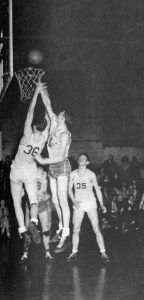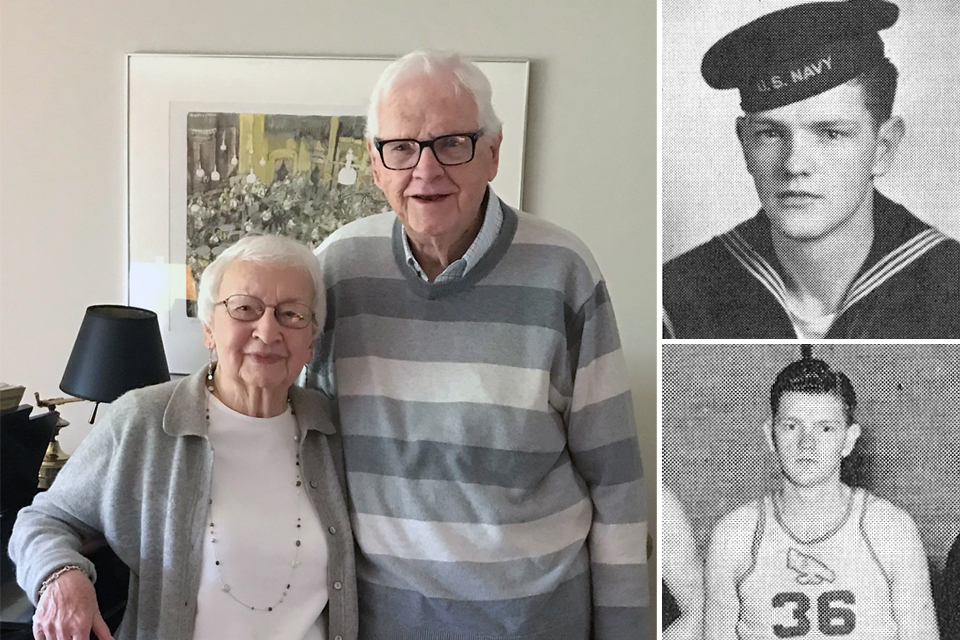He tried to keep his age a secret. At just 26 years old, Don Prince was Knoxville Junior-Senior High School’s second-youngest educator. He was also the principal.
“The gray hair fooled them,” quipped Claire Prince, his spouse of over 70 years.
In 1952 the young educator’s age was eventually outed by a senior class president as part of a school assembly quiz game.
Sometimes it felt like stupidity. But the University had faith in me, and that helped me to have faith in myself. -Don Prince
“I remember looking down the line of bleachers at the faculty, and they just slowly turned their heads to me as if to ask ‘Why did you never tell us this?’”
Subsequently, he went on to serve as the principal and superintendent of Princeton High School. The Crossville native was a well-respected, effective leader for the community. It was an example established by his parents, who were both educators. His father was a career teacher and principal despite never earning a high school diploma.
“It was certainly a different time when they taught,” Don Prince said. “But what they really showed is that teaching is in my blood.”

Don Prince (jersey number 36) makes a play at the rim against a defender during a Redbird men’s basketball game.
Prince himself earned his bachelor’s from Murray State in Kentucky. His master’s and doctoral degrees came from the University of Illinois, which housed the area’s only terminal degree program in educational administration during the 1950s.
Found something great
Word of Don Prince’s academic and professional successes in southeast Illinois eventually reached Normal. In 1960 he was recruited by Eric Johnson, Illinois State University’s vice president, and Frank Philpot, the head of the education program, to establish the Department of Educational Administration (EA) and the University’s first-ever doctoral program. The word “foundations” was added to the department’s name in the 1980s when undergraduate education courses started being offered.
Inevitably, Illinois State’s program directly competed for the same students as the University of Illinois. What’s more, EA consisted of a one-man wrecking crew its first year.
“He was the only faculty member. So not only was he recruiting students and faculty and running the department, but he was preparing courses,” Claire Prince said.
Don Prince recalls that there were only four or five students those first two years, and the challenge of the work often kept him up at night.
“Sometimes it felt like stupidity. But the University had faith in me, and that helped me to have faith in myself,” Don Prince said. “But periodically, at about 1 a.m., I would wake up and think to myself, ‘Will we be able to attract top, quality students?’”
The department was bolstered by his ability to recruit two outstanding minds as faculty: Ben Hubbard from the University of Alabama and Elwood Egelston from the University of Oregon. That support, coupled with Prince’s vision, changed people’s perspective about the department.
“The University of Illinois was so research-oriented, and it’s not that there’s anything bad about research. But what they did not get is that the best people become K-12 school administrators because they have a different mindset,” he said. “I thought we needed to be a university that was among the best in terms of researchers but also had professors who were down to earth and had a more practical approach to educational leadership.”
Don Prince said that most young administrators or aspiring administrators started coming to Illinois State by the early 1960s.
I liked Illinois State so much that after the war, that’s where I said I wanted to go. And that’s what I eventually did. -Don Prince
Department of legends
Another one of his faculty recruits was Edward Hines, who remains connected to the department as a Distinguished Professor and professor emeritus. He and Paul Baker were inaugural winners of the EAF Fellow award, the highest honor bestowed by the department.
“From his ISU position and establishing the new department, Don was appointed by Governor Dan Walker to chair the Illinois Board of Higher Education (IBHE),” Hines said. “Clearly anyone in Illinois Higher Education would agree that the IBHE chair’s position is one of the top higher education positions in the entire state.”
The late Alan Hickrod was another leading mind Prince recruited to EAF. The Harvard graduate later married Marcia Hickrod. She has served the University for over 50 years, including the last 25 with the College Student Personnel Administration program in EAF. She continues to advise aspiring higher education student affairs professionals to this day.
Don Prince recalls that Joe Mini ’47, M.S. ’54, Ed.D. ’66 and Joanne Peppard Cooke, Ph.D. ’66, were the first two graduates in 1966.
“Joanne was remarkable. Females were not included that much at that level in the 1960s,” he said. “But she was someone who helped to change that. She had a really successful career, and I was happy to hear that she started a scholarship for the department.”
It’s hard to find a field more challenging in terms of what the needs are than education. It needs creative leadership and creative ideas, and there are few other industries where those needs are as great as they are in education. It is professionally rewarding and recognized. -Don Prince
A textbook move
Don Prince served as chair and guided EAF for seven years, leaving to again initiate groundbreaking work in the publishing business. His next position was as vice president of Rand McNally, an organization then known for mapmaking, but would become one of the three major textbook manufacturers in the U.S. throughout the 1970s and 80s.
When Andrew McNally first asked him for a meeting, he was still chair of EAF. He thought the family-run business was going to ask him to write a book. Instead, they presented a job offer that made him the first educator to run the organization’s textbook division.
“Previously, it was always someone with a business background,” Prince said.
With Don Prince nodding in agreement, Claire Prince recalls the day she knew they were leaving Illinois State.
“They sold Don on it. And I think he was receptive because at that point the program at Illinois State was going great. They had top-notch professors, good students, and a good successor for the job. Don was ready for a new challenge,” she said.
His first major initiative in his new role was to insert strong female characters into the stories that they were distributing to young readers.
“Those types of characters were almost completely missing,” he said.
He personally poured over drafts of textbooks and counted the number of male and female characters in each story. He then determined whether the narrative portrayed characters who were playing active or passive roles. Each time there was a discrepancy, Don Prince and his team edited the texts and created equal representation.
“If a character was climbing a tree in a second-grade book, we wanted to make sure it wasn’t always a boy with a girl just sitting there meekly watching him,” he said. “We didn’t want to support those stereotypes, and we broke some new ground because we were one of the first groups in the industry to begin looking at those things.”
When Don Prince took the Rand McNally gig, it necessitated a move to the Chicagoland area. Though Claire Prince was not immediately thrilled with the move, it opened new doors for her. The Princes’ home was just 15 minutes from Northwestern University and she was recruited to serve on the staff for its top administrators and board of trustees. Her tenure spanned 22 years until her retirement at age 72.
“That was a wonderful opportunity, and it would not have happened if we did not make the move,” Claire Prince said, “But I could have lived in Normal forever.”
“Illinois State is a wonderful place and university,” Don Prince added.
Retiring (but not really)
In 1992, a few years after Don Prince retired from publishing, he was approached by the Illinois Student Assistance Commission to consult on, and ultimately author, the program for College Illinois. The program is now known as the 529 college savings plan, and it has helped millions of Illinois residents—and their families—afford college tuition.
“I was proud of that, but I adapted the idea for Illinois,” he said. “I worked closely with two outstanding educators in Texas who had recently established a similar program for the Lone Star State.”
Don Prince was first introduced to Illinois State in 1944 at age 18. He was accepted into the University to complete the V-12 Navy officer training program. He then served in the Navy through the end of World War II.
“I liked Illinois State so much that after the war, that’s where I said I wanted to go. And that’s what I eventually did,” he said.
A true lifelong student, Don Prince went on to earn a second master’s from the University of Chicago in 1973 and was bestowed an honorary Doctor of Laws degree from Illinois State in 1981.
At age 93, Prince does not feel as though he left anything on the table during his professional career.
“I was too busy to think about what I had not done,” he said.
Reflecting on his work and the value of educators today, Prince said that he does not stray much from what his thoughts were over 70 years ago.
“It’s hard to find a field more challenging in terms of what the needs are than education,” he said. “It needs creative leadership and creative ideas, and there are few other industries where those needs are as great as they are in education. It is professionally rewarding and recognized.”


thank you for the information
You are welcome, Logan! If you’d like a more comprehensive early history of the EAF department, let me know at tjnavic@IllinoisState.edu. We have a document written by the first few department chairs that paints a more detailed picture.